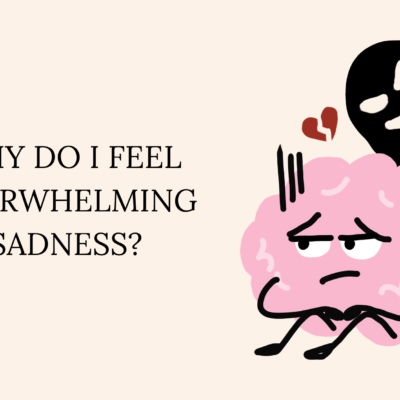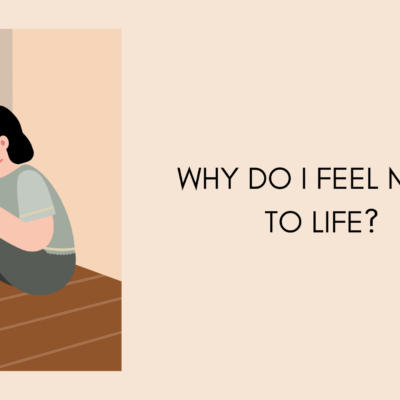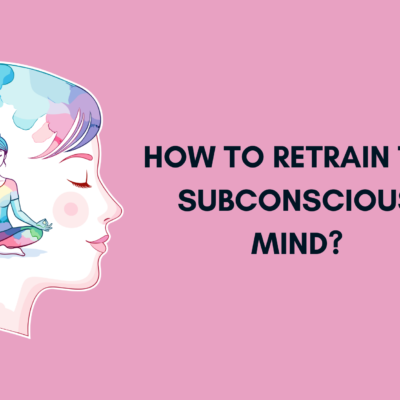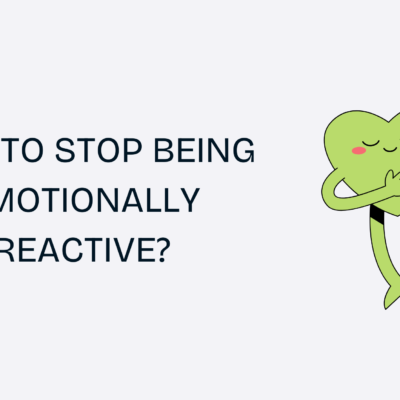Why do I Start Crying out of Nowhere: Have you ever found yourself suddenly tearing up — while doing something ordinary like washing dishes, scrolling through your phone, or even during a conversation that seemed light-hearted? You may have thought, “Why am I crying? Nothing’s even wrong.”
These moments can be confusing, even alarming. But they are not uncommon. Crying “out of nowhere” is often your body and mind’s way of processing emotions that have been buried, ignored, or building up silently over time.
In this article, we’ll explore the many psychological, emotional, and biological reasons why people cry unexpectedly — and how to gently understand what your tears might be trying to tell you.
Also Read:
1. You’re Bottling Up Emotions
One of the most common causes of sudden crying is emotional suppression.
Many people are taught — explicitly or implicitly — that expressing emotions is a sign of weakness. So, they bottle things up: stress, sadness, frustration, anger, fear. But those emotions don’t disappear. They build pressure in the background, waiting for a moment when the conscious mind is distracted — and then they surface in the form of sudden tears.
Signs this may be your case:
- You feel “fine” most of the time, but then cry during quiet moments
- You tend to stay busy or distracted all day
- You struggle to talk about your feelings with others
Tears are not the breakdown — they’re the release.
Your body is releasing emotional tension that’s been stored for too long.
2. Your Nervous System Is Overwhelmed
Crying out of nowhere can be your body’s way of regulating your nervous system.
When you’re under chronic stress — even low-level — your nervous system can remain in a constant state of hyperarousal. You might not feel “stressed” in the traditional sense, but your body is on edge. Small things trigger big emotional waves.
This often shows up in:
- Sudden crying during seemingly calm moments
- Feeling fine until a small inconvenience causes an outburst
- Crying after finishing a big task or finally getting time to rest
This is sometimes called a “parasympathetic crash.” When your body finally feels safe to let go, it unleashes the emotions it has been holding back.
3. Unprocessed Trauma or Grief
Tears that come without a “clear reason” are sometimes tied to past trauma or unresolved grief.
When the mind experiences trauma — whether emotional, physical, or psychological — it often stores those experiences in the body if they can’t be fully processed at the time. This is especially true for:
- Childhood emotional neglect or abuse
- Loss of a loved one
- Heartbreak or betrayal
- Medical trauma or surgeries
- Accidents or life-threatening experiences
Over time, these stored experiences may rise to the surface — often without a specific trigger. A scent, a sound, or even a thought that passes too quickly to notice can unlock a cascade of emotion.
If your tears feel “out of context,” it could be your body trying to finally release what it couldn’t at the time.
4. Depression or Anxiety
One of the lesser-known signs of depression and anxiety is crying spells that seem to come out of nowhere.
In depression, crying can stem from:
- Persistent sadness or emptiness
- Low self-worth
- A sense of hopelessness
- Emotional numbness followed by sudden floods of emotion
In anxiety, tears may result from:
- Feeling overwhelmed or panicked
- Constant overthinking or mental fatigue
- Fear of losing control
These tears often feel confusing: “I don’t know why I’m crying. I don’t even feel sad.” But the emotional and mental exhaustion caused by anxiety or depression can burst through when your system is overloaded.
If you find yourself crying frequently and also experiencing fatigue, restlessness, irritability, or loss of interest in daily activities, it may be helpful to speak to a mental health professional.
5. Hormonal Imbalances
Hormones significantly affect our emotional state. Sudden, unexplained crying can sometimes be linked to hormonal fluctuations.
Common scenarios include:
- Premenstrual Syndrome (PMS): Mood swings, irritability, and sudden crying are common in the days before menstruation.
- Pregnancy: Emotional sensitivity increases, especially during the first and third trimesters.
- Postpartum Period: The drastic hormonal drop after childbirth can lead to unexpected tears, sometimes as part of postpartum depression.
- Menopause or Perimenopause: Estrogen fluctuations can affect emotional regulation, causing mood swings and unexplained crying.
- Thyroid issues: Hypothyroidism can also lead to emotional instability and depression-related symptoms.
If your crying episodes seem cyclical or are accompanied by physical symptoms (like fatigue, weight changes, or irregular cycles), it’s worth checking with a medical professional.
6. You’re Deeply Empathetic or Highly Sensitive
Some people are naturally more emotionally attuned — often described as Highly Sensitive Persons (HSPs) or empaths.
If you:
- Cry after watching a heartfelt movie or listening to a moving song
- Absorb other people’s emotions
- Get overwhelmed in crowded or emotionally intense environments
You may be more emotionally porous than others. That’s not a weakness — it’s a gift of depth and compassion. But it can also mean you need more emotional recovery time and more tools to manage emotional overload.
Sudden crying, in this case, is your body’s way of telling you: “This is too much. I need to release.”
7. Suppressed Anger or Frustration
Sometimes, what seems like sadness is actually anger turned inward. If you’ve been taught not to express anger — or feel guilty for doing so — your body might redirect those emotions into tears.
Signs this might be happening:
- Crying after being criticized or dismissed
- Feeling exhausted after conflict, even if you didn’t argue
- Having a lump in your throat when you want to speak up but don’t
Suppressed anger often disguises itself as sadness or numbness. When it has nowhere to go, it finds a release through tears.
8. Loneliness or Emotional Starvation
In a world of constant connection, it’s still possible to feel deeply emotionally lonely. You may have people around, but if you don’t feel truly seen, heard, or understood, your emotional needs remain unmet.
Tears that seem random might actually be your soul’s quiet cry for connection. You may not even realize how emotionally isolated you feel until the tears come.
This can happen during or after:
- A superficial conversation
- Scrolling through social media
- Realizing someone didn’t check on you
- Moments of silence where your heart catches up with your mind
9. Existential Fatigue or “Soul Exhaustion”
Sometimes crying out of nowhere is not about one event or one emotion — it’s about a deep, spiritual fatigue.
You’ve been strong too long. You’ve pushed through too many things. You’re living on autopilot. And suddenly, your soul says, “I can’t carry this alone anymore.”
This kind of crying may feel like:
- A soft breakdown that turns into clarity
- Weeping during stillness or prayer
- A wave of sadness with no name, but deep roots
It’s a call to reconnect — not just with others, but with yourself.
How to Respond When It Happens
If you find yourself crying suddenly, try not to shut it down or shame yourself. Here are some gentle ways to support yourself:
1. Pause and Breathe
Allow yourself to feel. Crying is a natural release — a reset for your nervous system. Deep, slow breaths can help you stay grounded.
2. Ask, “What needs to be felt?”
Instead of pushing the tears away, ask gently:
What am I holding? What emotion wants to be witnessed?
Often, the act of naming the emotion — even if it’s “I don’t know” — helps release it.
3. Find a safe outlet
- Journal your feelings without judgment
- Talk to a trusted friend
- Move your body — walk, stretch, dance
- Listen to music that soothes or mirrors your mood
4. Offer compassion to yourself
Say things like:
- “It’s okay to cry. Nothing’s wrong with me.”
- “These tears are carrying something important.”
- “I’m allowed to feel deeply.”
When to Seek Help
While occasional crying spells are normal, frequent or uncontrollable emotional episodes may signal deeper issues that need support.
Consider reaching out to a mental health professional if:
- You cry daily or feel emotionally overwhelmed
- You feel numb, hopeless, or like life has lost meaning
- Your relationships, work, or daily functioning are affected
- You suspect unresolved trauma or depression
Therapy can help you explore the root causes of your emotional patterns and build healthy coping mechanisms.
Final Thoughts: Tears Are Messengers, Not Weakness
Crying doesn’t always mean something is wrong. Sometimes, it means something is trying to heal, to release, or to be seen.
Your tears are not your enemy — they’re your truth surfacing, asking to be heard.
Whether they’re a whisper from your subconscious, a sign of burnout, or a sacred form of emotional release, sudden tears are a reminder that you are deeply human, beautifully sensitive, and more in need of gentleness than judgment.
Let them come. Let them speak.
And above all — listen.






